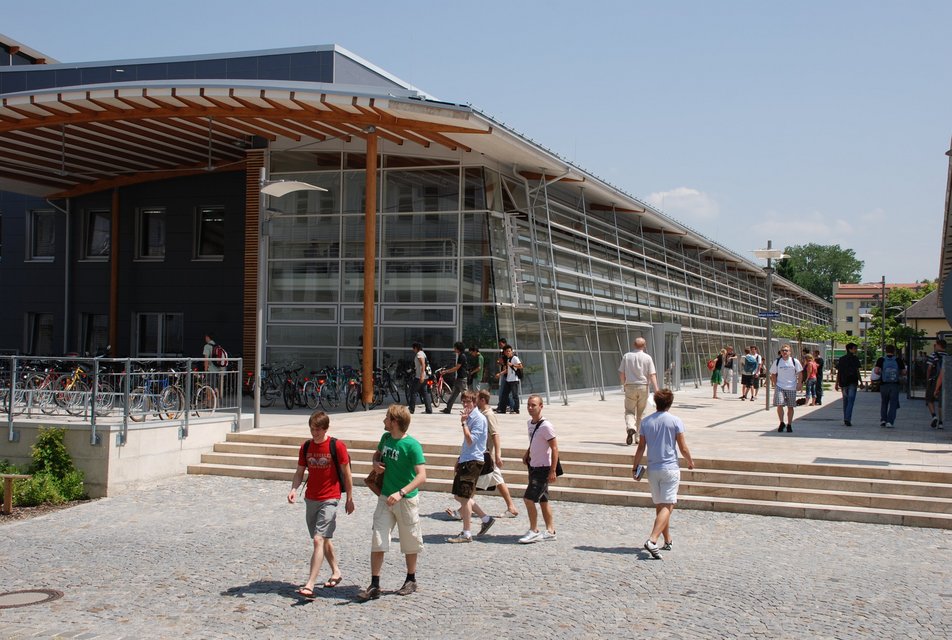The Master's programme in Building Physics combines areas of knowledge and questions of theoretical and applied building physics. In addition to the specialization in acoustics and sound insulation with the associated measurement technology, the areas of thermal building physics and sustainable energy systems primarily deal with the scientific and mathematical concepts of the necessary model approaches and simulation tools.
The new master's degree course in building physics is a cooperative master's degree course with the courses of study in building physics and climate engineering at the Stuttgart University of Applied Sciences (HFT) and - in external cooperation - with the courses of study in energy and building technology, timber construction and finishing and interior design at the Rosenheim University of Applied Sciences (THRo).
15 January for the start of studies in the summer semester in Rosenheim
15 July for the start of the winter semester in Stuttgart
3 Semester
Master of Engineering (M. Eng.)
Energy efficiency, energy saving, noise protection, room acoustics, technical acoustics (also in the automotive industry),
psychoacoustics, building damage analysis (court expert),
Regenerative energy and building services engineering, solar heating and cooling are just a few of the areas in which specially trained specially trained building physicists are in demand - and for a long time to come!
In both semesters the mathematical and physical knowledge based on the bachelor level is expanded and special advanced modules in the fields of energy and acoustics are offered. A large proportion of laboratory work with practice-oriented exercises accompanies the theoretical training. With the elective lectures and the interdisciplinary study projects, students determine a focus: acoustics and sound insulation (A) or thermal-hygric building physics and energy technology (E). An overview of the courses offered is shown in the following diagram.
Project work
The project work gives students the opportunity to intensively familiarize themselves with a specific topic each semester. The processing and support is carried out within the university or, in the case of projects, at companies, engineering offices or institutes outside the universities. Within the universities, the project work often corresponds to subtasks of ongoing research projects. The time and effort required for the project work corresponds approximately to the time and effort required for a Bachelor thesis.
In the context of project work, projects are either specified or proposed by the students themselves. The processing and support is carried out within the university or, in the case of projects, at companies, engineering offices or institutes outside the universities. The students exchange information on problem solving with representatives of different academic and non-academic fields of action in a subject-related and subject-related manner.
The project work is documented in a report and presented in a seminar. In addition to professional qualifications, the ability to work in a team, initiative, willingness to communicate, presentation and moderation skills are also central to this form of teaching. Seminars and project work serve to deepen and apply the knowledge acquired in a lecture and create the basis for independent scientific work.
Laboratory work
The Department of Building Physics has its own laboratory building with various testing facilities and test setups, some of whose concepts and acoustic designs were developed during the course of study. The acoustic test facilities are state-of-the-art and are among the most modern in Europe. (see also testing facilities in the field of building physics)
The prerequisite for admission to the Master's programme in Building Physics is a first professionally qualifying university degree (Bachelor, Diploma or equivalent) in the fields of building physics, climate engineering, energy and building technology, timber construction and finishing, interior design or an engineering discipline of a related discipline after a full-time study programme of at least three and a half years (210 credit points according to ECTS).
In addition, the following specialized knowledge must be demonstrated:
Mathematics: 10 CP
Fundamentals of physics and building physics: 12 CP
The general conditions of the job market for graduates of building physics can be characterized as extremely positive. The current labour market situation leads us to expect that graduates will be able to take up adequate employment immediately after completing their studies.
Graduates find employment as planning and consulting engineers in engineering offices, in general contractors in the construction and energy sector, in urban planning and building authorities of cities and municipalities, as well as development engineers in manufacturing companies. For special fields of activity in technical acoustics and supply engineering, there are also professional fields of activity in the field of research at universities and institutes.
Field of Study Building Physics | Master Building Physics
| News | Building physics | Climate Engineering | Building physics | SENCE | Facilities | Projects | Personnel |
![[Image: Foto: A. Körner] Aussenaufnahme des Zentrums für Bauphysik](/fileadmin/Dateien/Bauphysik/_processed_/b/f/csm_MA-GP_ZFB_NordseiteUebersicht1_eace43734c.jpg)
![[Image: Foto Studiengang Bauphysik] Thermografie-Aufnahme eines Gebäudes](/fileadmin/Dateien/Bauphysik/_processed_/6/6/csm_MA-GP_Inhalt4_18c266f13b.jpg)
![[Image: Foto pixabay] Aussenaufnahme eines Gebäudes](/fileadmin/Dateien/Bauphysik/_processed_/0/8/csm_MA-GP_Inhalt1_47eda79a83.jpg)
![[Image: Foto pixabay] Ein Frequenzspektrum](/fileadmin/Dateien/Bauphysik/_processed_/6/0/csm_MA-GP_Inhalt3_ba00e55ff4.jpg)
![[Image: Foto pixabay] Zwei Personen arbeiten an Laptops](/fileadmin/Dateien/Bauphysik/_processed_/0/5/csm_MA-GP_Inhalt5_b567028ffc.jpg)
![[Image: Foto pixabay] Der Verkehr spiegelt sich in einem Fenster](/fileadmin/Dateien/Bauphysik/_processed_/c/a/csm_MA-GP_Inhalt6_4df549114f.jpg)
![[Image: Foto pixabay] Aussenaufnahme eines schattierten Gebäudes](/fileadmin/Dateien/Bauphysik/_processed_/6/7/csm_MA-GP_Inhalt2a_5f063410af.jpg)
![Study flow chart Master Building Physics [Image: Grafik Studiengang Bauphysik] Study flow chart Master Building Physics](/fileadmin/Dateien/Bauphysik/_processed_/5/0/csm_MA-GP_Studienablaufgrafik_en_4d0031d7d9.jpg)
![[Image: Foto pixabay] eine gezeichnete Figur liest ein Buch](/fileadmin/Dateien/Bauphysik/_processed_/e/6/csm_white-male-1_dbcbe06964.jpg)
![[Image: Foto pixabay] eine gezeichnete Figur mit einem Doktorhut](/fileadmin/Dateien/Bauphysik/_processed_/f/1/csm_white-male-2_40a4c5c1e2.jpg)
![[Image: Foto pixabay] Mathematische Formeln](/fileadmin/Dateien/Bauphysik/_processed_/f/5/csm_MA-GP_Schwerpunkte1_2948ddd0de.jpg)
![[Image: Foto pixabay] Impressionen Baustellen](/fileadmin/Dateien/Bauphysik/_processed_/9/d/csm_MA-GP_Praxis1_5eb50f3b91.jpg)
![[Image: HFT Stuttgart] Luftaufnahme der HFT Stuttgart](/fileadmin/Dateien/Bauphysik/Master-Gebaeudephysik/MA-GP_HFT_Campus.jpg)
